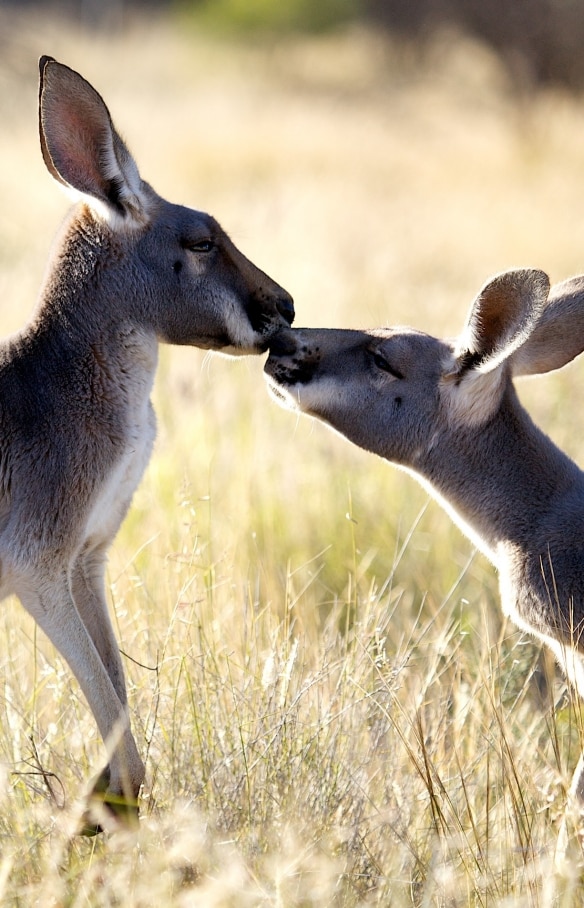
Kangaroo, Lucky Bay, Esperance, Western Australia © Tourism Western Australia
Kangaroo, Lucky Bay, Esperance, Western Australia © Tourism Western Australia
Where to spot kangaroos in the wild
With these tips, you’ll be hanging out with one of Australia's most iconic animals in no time.
Humans aren’t the only creatures who like to feel the sand between their toes; kangaroos regularly sun themselves at a handful of Aussie beaches. One of the most photogenic is Lucky Bay, in Western Australia’s Cape Le Grand National Park, with pristine white sand and vibrant blue waters. Just south of Sydney, roos are often found lazing at Pebbly Beach. In Queensland, wallabies (smaller relatives of the kangaroo) cluster on the beach at Cape Hillsborough National Park at dawn and dusk.
Kangaroos aren’t just found on Australia’s mainland. As you’d expect, there are loads on the eponymous Kangaroo Island, a short journey from Adelaide. In fact, there are so many roos here that hire vehicles are prohibited from driving at dawn and dusk when wildlife emerges to graze on roadsides. Meanwhile, the largest marsupial on Tasmania’s Maria Island – and the second largest marsupial in the world – is the forester kangaroo. Look out for it in grassy forests and woodlands.
Kangaroos love the wide open spaces found across the country. The Australian National Botanic Gardens in Canberra is a great inner-city option for spotting kangaroos, with eastern greys out and about early in the mornings. Just outside the city, hundreds of roos roam at Namadgi National Park. Three species of kangaroo can be found within the rugged landscape of South Australia’s Flinders Ranges, while communities of roos laze beside one of the world’s tallest tree forests in Pemberton in Australia’s southwest.
Queensland’s tree kangaroos are one of the trickier kangaroo species to see. Hidden among the leafy canopy of the World Heritage-listed Daintree Rainforest, Australia’s two species of tree kangaroos look more like huge possums, with blackish-brown fur and super long tails. These rare nocturnal creatures don’t move around much during the day, so your best bet for spotting one is to go on a wildlife walk at night. Alternatively, you can head to Wildlife Habitat Port Douglas or Adelaide Zoo for a closer look.
It’s not uncommon to spot a kangaroo between the rows of vines in any of Australia’s wine regions. There are loads in Western Australia’s Margaret River, while several wine tours in the Hunter Valley combine tastings of exceptional local drops with roo sightings. South Australia’s Barossa Valley and Canberra’s vineyards are both great for spotting wildlife as you taste your way through the regions.
Drawn to the well-watered grass, kangaroo sightings are practically guaranteed on Australia’s postcard-worthy golf courses. A visit to Noosa Golf Club, Anglesea Golf Club or the Federal Golf Club offers great chances at spotting wild roos. In New South Wales, some popular golf clubs even offer kangaroo-spotting tours in a golf buggy, such as Hunter Valley Golf & Country Club and Nelson Bay Golf Club.

























































































































































